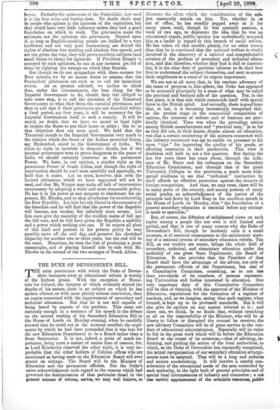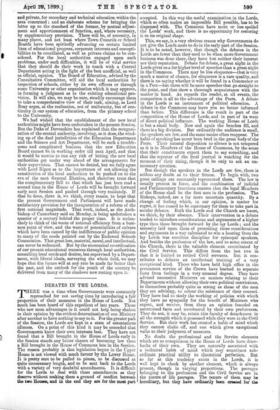THE DUKE OF DEVONSHIRE'S BILL.
THE persistence with which the Duke of Devon- shire away at educational reform is worthy of the highest praise. With the exception of Home- rule for Ireland, the dangers of which evidently stirred the depths of his nature, there is no subject on which he has spoken oftener, or with more plainly earnest conviction, than on topics connected with the improvement of secondary and technical education. Not that he is not still capable of being bored by aspects of the problem. This came out curiously enough in a sentence of his speech in the debate on the second reading of his Secondary Education Bill in the House of Lords on Monday evening, when he candidly avowed that he could not at the moment recollect the argu- ments by which he had been persuaded that it was best for the new Education Department to be a Board rather than a State Secretariat. It is not, indeed, a point of much im- portance, being more a matter of names than of essence, for, as Lord Kimberley observed the other night, it is very im- probable that the other holders of Cabinet offices who are mentioned as having seats on the Education Board will ever attend its sittings. The Board will be the Minister of Education and the permanent officials. But the Duke's naive acknowledgment with regard to the reasons which had governed the determination of that particular detail in the general sche.me of reform, serves, we may well believe, to illustrate the effort which the- -consideration of the sub- ject constantly entails on him. Yet, whether in or out of office, he has steadily pegged away at it for many years, until, though he was quaintly anxious, a week or two ago to deprecate the idea that he was an educational expert, public opinion has undoubtedly accepted him as a leader in regard to this branch of social reform. He has taken all this trouble, plainly, for no other reason than that he is convinced that the national welfare is vitally involved in the discovery of a rational and comprehensive solution of the problem of secondary and technical educa- tion, and that therefore, whether they find it dull or interest- ing, it is the clear duty of patriotic citizens to do their best first to understand the subject themselves, and next to arouse their neighbours to a sense of its urgent importance.
We are not at all sorry that, in his resolute advocacy of the cause of progress in this sphere, the Duke has appeared to be animated principally by a sense of what may be called the practical and business side of the question. For, in the first place, it is that side which commends itself with special force to the British mind. And secondly, there is good hope that, at last, it is becoming increasingly recognised that, at the present stage in the commercial competition of nations, the interests of culture and of business are prac- tically identical. Time was when the prevailing notion among British manufacturers and "practical men," in so far as they did not, in their hearts, despise almost all education, was that a certain smattering of the sciences connected with the industry concerned was apt to enable its possessor to hit upon " tips " for improving the quality of his goods, or effecting economies in their production. This view is doubtless still held in not a few quarters. But during the last few years there has come about, through the influ- ence of Mr. Bryce and his colleagues on the Secondary Education Commission, and through that of the great University Colleges in the provinces, a much more wide- spread readiness to see that " technical " instruction by itself affords no effective protection against the dangers of foreign competition. And thus, we may trust, there will be in many parts of the country, and among persons of many social grades, an acknowledgment of the justice of the principle laid down by Lord Reay in his excellent speech in the House of Lords on Monday, that "the foundation of a general secondary education is essential before any attempt is made to specialise."
But, of course, the diffusion of enlightened views on such topics among a people like our own is still limited and partial, and that is one of many reasons why the Duke of Devonshire's Bill, though he modestly calls it a small measure, is of essential consequence to the satisfactory start- ing of a national system of secondary education reform. The Bill, as our readers are aware, brings the whole field of secondary, technical, and elementary education under the authority of one great State Department, the Board of Education. It also provides that the President of that Board shall have the advantage of the advice, not only of the permanent officials of the Department, but also of a Consultative Committee, consisting, as to not less than two-thirds of its numbers, of persons represent- ing Universities and bodies interested in education. One very important duty of this Consultative Committee will be that of framing, with the approval of the Minister of Education, regulations for the formation of a register of teachers, and, as we imagine, seeing that such register, when formed, is kept up to its professed standards. But it will also give its opinion on any matter referred to it ; and there can, we think, be no doubt that, without trenching at all on the responsibility of the Minister, who will be at liberty to follow or disregard the counsel he receives, the new advisory Committee will be of great service to the con- duct of educational administration. Especially will its value be felt in the great work which will lie before the Education Board at the outset of its existence,—that of advising, in- forming, and guiding the action of the local authorities, to which, as the Duke of Devonshire has repeatedly recognised, the actual reorganisation of our secondary education arrange- ments must be assigned. That will be a long and arduous and action 'undertaking. It will involve a careful con- sideration of the educational needs of the area controlled by each authority, in the light both of general principles and of special local circumstances of industry and commerce ; a not leas careful appraisemant of the available resources, public and private, for secondary and technical education within the area concerned ; and an elaborate scheme for bringing the latter up to the standard of the former, by mutual adjust- ment and apportionment of function and, where necessary, by supplementary provision. There function, be, of necessity, in many places, and not least where Town Councils or School Boards have been spiritedly advancing on certain limited lines of educational progress, corporate interests and suscepti- bilities to be conciliated, as well as private claims to be con- sidered. For the local authorities engaged upon such problems, under such difficulties, it will be of vital service that they should do their work in touch with a Central Department acting in the light of the best unofficial, as well as official, opinion. The Board of Education, advised by the Consultative Committee, will aid the local authorities by inspection of schools, either by its own officers or through some University or other organisation which it may approve, in forming a judgment as to the existing educational pro- vision. It will also, we may be sure steadily encourage them to take a comprehensive view of their task, aiming, as Lord Reay urges, at the realisation, not of uniformity, but of con- tinuity in our system of education, from the primary school to the University. We had wished that the establishment of the new local authorities might have been undertaken in the present Session. But the Duke of Devonshire has explained that the reorgani- sation of the central authority, involving, as it does, the wind- ing up of the dual jurisdiction of the Education Department and the Science and Art Department, will be such a trouble- some and complicated business that the new Education Board cannot be in working order till next April, and that it would be unwise to run any risk of letting the new local authorities get under way ahead of the arrangements for their supervision. That cannot be denied, but we fully agree with Lord Ripon as to the importance of not allowing the constitution of the local authorities to be pushed on to the eve of the next General Election, and therefore trust that the complementary Bill to that which has just been read a second time in the House of Lords will be brought forward early next Session and pushed through very resolutely. If that be done, there is, we think, every reason to hope that the present Government and Parliament will have made satisfactory provision for the inauguration of a reform of the first national magnitude. That work, indeed, as the Arch- bishop of Canterbury said on Monday, is being undertaken a quarter of a century behind the proper time. It is melan- choly to think of the waste of national efficiency from a busi- ness point of view, and the waste of potentialities of culture which have been caused by the indifference of public opinion to many of the needs pointed out by the Endowed Schools Commission. That great loss, material, moral, and intellectual, can never be redeemed. But by the economical co-ordination of our present educational resources through local authorities, consulting local needs and desires, but supervised by a Depart- ment, with liberal ideals, surveying the whole field, we may hope that the future will at any rate be made far better than the past, and the outlook for the youth of the country be delivered from many of the shadows now resting upon it.























































 Previous page
Previous page